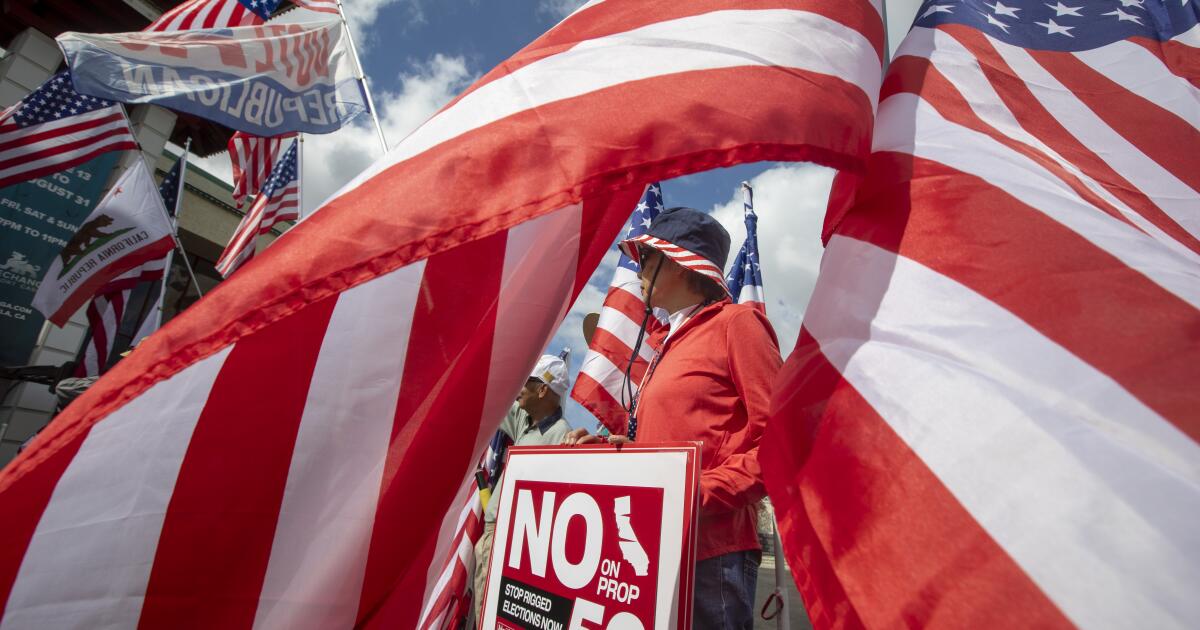
We now have an estimated price tag for California’s special election and Gov. Gavin Newsom’s presidential rollout: $282.6 million.
The Nov. 4 vote involves Proposition 50, which would gerrymander the state to boost Democratic chances of winning as many as five added House seats in the 2026 midterm election. The intent is to partially compensate for Republican gerrymanders in Texas and other states.
The ballot measure has already done wonders to boost Newsom’s early standing in the 2028 presidential contest — emphasis on the word early. After alienating many in his party by playing footsie with the likes of Steve Bannon and the late Charlie Kirk, Newsom has set hearts aflutter among those yearning for Democrats to “fight back against Trump,” to cite what has become the party’s chief animating principle and cri de cœur.
One could ask whether the not-insignificant cost of the special election is the best use of taxpayer dollars, or if the sum would be better spent, as veteran GOP strategist Ken Khachigian suggested in a recent Wall Street Journal opinion piece, “on firefighters, police officers, schoolteachers and road repairs.”
Newsom, in full barricade-manning mode, has said protecting our precious democracy is “priceless.”
The chairman of California’s Democratic Party, Rusty Hicks, placed a more concrete price tag on the virtues of Proposition 50, suggesting to the Bay Area News Group that money spent on the special election would be offset — and then some — by the billions California would otherwise lose under President Trump’s hostile regime.
There is, however, an added, if intangible, cost to Proposition 50: Effectively disenfranchising millions of conservative and Republican-leaning Californians, who already feel as though they’re ignored and politically impotent.
Under the Democratic gerrymander, the already-meager Republican House contingent — nine of 52 California House members — could be cut practically in half. Starting in January 2027, the state’s entire Republican delegation could fit in a Jeep Wagoneer, with plenty of room to spare.
This in a state where Trump received over 6 million votes in 2024.
The would-be autocrat issuing diktats from the Oval Office may be odious to many. But making people feel as though their vote is irrelevant, their voice is muzzled and they have no stake in our political system because elections are essentially meaningless — at least as far as which party prevails — is not a recipe for a contented and engaged citizenry, or a healthy democracy.
We already have a chief executive who has repeatedly demonstrated that he sees himself as the president of red America, of those who support him unequivocally, with everyone else regarded as evil or subversive. We’ve seen how well that’s worked out.
Is the solution electing a governor for blue California, who — if not openly scorning the state’s millions of Republicans — is willing to render them politically powerless?
All seven of the major Democrats running to succeed Newsom support Proposition 50. (The two leading Republican — and underdog — candidates, Riverside County Sheriff Chad Bianco and conservative commentator Steve Hilton, are opposed, which is no surprise.)
Your friendly columnist put the question to those seven Democrats. What do they say to Republican voters who already feel disregarded and politically unrepresented? As governor, is there a place for them in your vision of California?
Most, as you’d expect, vowed to be a governor for all: Red, blue, independent, libertarian, vegetarian.
Former Rep. Katie Porter noted she served a purple Orange County district and won support from voters of all stripes “because they knew I wouldn’t hesitate to stand up for anyone — no matter to what party they belong — who makes life harder for California families.” She said in a text message she’d bring “that same tenacity, grit and courage” to Sacramento.
Toni Atkins, a former Assembly speaker and state Senate leader, texted that she’s “made it a priority to listen to every Californian — Democrat, Republican, and Independent.” Assailing Republicans in Congress, she described Proposition 50 as “a way to fight back now” while eventually reverting to the independent redistricting commission that drew up the current congressional lines.
Xavier Becerra, the state’s former attorney general and a member of Joe Biden’s cabinet, said he would work to see that all Californians, regardless of party, benefit from his leadership on healthcare, housing and making the state more affordable. Doing that, he texted, requires fighting Trump and “Republican extremists” seeking to rig the midterm elections.
Betty Yee, the former state controller, just finished a campaign swing through rural California, where, she said, voters asked similar questions along the lines of what about us? Those vast reaches beyond the state’s blue coastal enclaves have long been a hotbed of resentment toward California’s ruling Democratic establishment.
Yee said she urged voters there to “look at your representation now.” The Republican-run Congress, she noted, has approved budget cuts that threaten to shut down rural hospitals and gut badly needed social safety-net programs. “How is that representing your interest?” she asked.
Tony Thurmond, the state schools superintendent, said much the same.
“One of the reasons that I support this measure is because California Republicans in Congress who voted for the ‘big, beautiful bill’ voted for a bill that they knew was going to throw millions of people off of health insurance,” Thurmond said. “And that’s troubling, and I actually think that this is a way to counter that action and to make changes in Congress.”
Former Los Angeles Mayor Antonio Villaraigosa and businessman Stephen Cloobeck ignored the question about Republican sentiments and assailed Trump.
Villaraigosa called Proposition 50 “a temporary … direct response to MAGA’s election rigging efforts in Texas.” Cloobeck texted, “This is not the way it should be, but democracy and California are under attack, and there is no way in hell I’m not going to FIGHT.”
There’s a certain presumption and paternalism to the notion that California Democrats know what’s best for California Republicans.
But as Thurmond noted, “They have a right to vote it down. We’re putting it in front of the voters and giving them a chance to exercise their viewpoints, democratically.”
Every Californian who casts a ballot can decide what best suits them.
As they should.



